情态动词can could may might练习
- 格式:ppt
- 大小:347.00 KB
- 文档页数:21
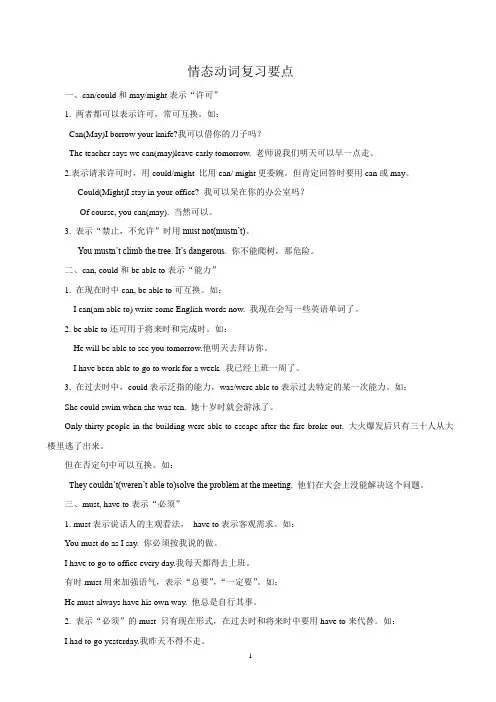
情态动词复习要点一、can/could和may/might表示“许可”1. 两者都可以表示许可,常可互换。
如:Can(May)I borrow your knife?我可以借你的刀子吗?The teacher says we can(may)leave early tomorrow. 老师说我们明天可以早一点走。
2.表示请求许可时,用could/might 比用can/ might更委婉。
但肯定回答时要用can或may。
---Could(Might)I stay in your office? 我可以呆在你的办公室吗?--- Of course, you can(may). 当然可以。
3. 表示“禁止,不允许”时用must not(mustn’t)。
You mustn’t climb the tree. It’s dangerous. 你不能爬树,那危险。
二、can, could和be able to表示“能力”1. 在现在时中can, be able to可互换。
如:I can(am able to) write some English words now. 我现在会写一些英语单词了。
2. be able to还可用于将来时和完成时。
如:He will be able to see you tomorrow.他明天去拜访你。
I have been able to go to work for a week. 我已经上班一周了。
3. 在过去时中,could表示泛指的能力,was/were able to表示过去特定的某一次能力。
如:She could swim when she was ten. 她十岁时就会游泳了。
Only thirty people in the building were able to escape after the fire broke out. 大火爆发后只有三十人从大楼里逃了出来。
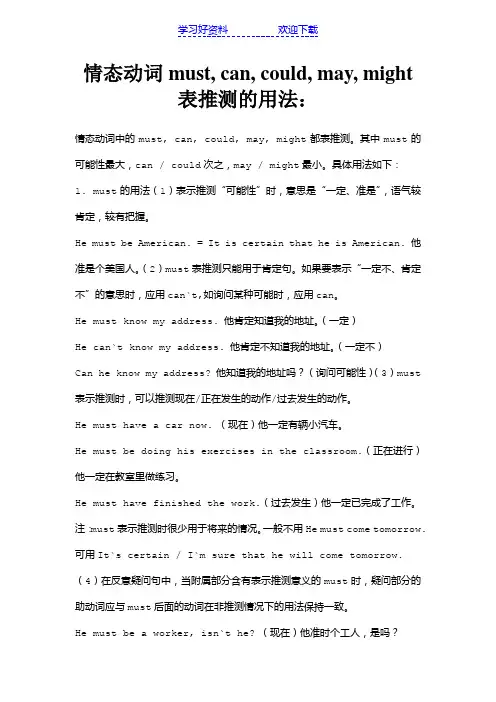
情态动词must, can, could, may, might表推测的用法:情态动词中的must, can, could, may, might都表推测。
其中must的可能性最大,can / could次之,may / might最小。
具体用法如下:1. must的用法(1)表示推测“可能性”时,意思是“一定、准是”,语气较肯定,较有把握。
He must be American. = It is certain that he is American. 他准是个美国人。
(2)must表推测只能用于肯定句。
如果要表示“一定不、肯定不”的意思时,应用can`t,如询问某种可能时,应用can。
He must know my address. 他肯定知道我的地址。
(一定)He can`t know my address. 他肯定不知道我的地址。
(一定不)Can he know my address? 他知道我的地址吗?(询问可能性)(3)must 表示推测时,可以推测现在/正在发生的动作/过去发生的动作。
He must have a car now. (现在)他一定有辆小汽车。
He must be doing his exercises in the classroom.(正在进行)他一定在教室里做练习。
He must have finished the work.(过去发生)他一定已完成了工作。
注:must表示推测时很少用于将来的情况。
一般不用He must come tomorrow.可用It`s certain / I`m sure that he will come tomorrow. (4)在反意疑问句中,当附属部分含有表示推测意义的must时,疑问部分的助动词应与must后面的动词在非推测情况下的用法保持一致。
He must be a worker, isn`t he? (现在)他准时个工人,是吗?It must have rained last night, didn`t it? (过去)昨晚一定下雨了,是不是?You must have learned English for many years, haven`t you? (完成时)你一定学了好多年英语,是吗?2. can / could的用法(1)can表示推测“可能性”时,往往用于否定句或疑问句。

情态动词情态动词有can (could), may (might), must, have to, shall (should, will (would), dare (dared), need (needed), ought to等。
情态动词无人称和数的变化;不能单独使用,必须与其后的动词原形构成谓语。
一、can, could1) 表示能力(体力、知识、技能)。
如:Can you lift this heavy box? (体力)Mary can speak three languages.(知识)Can you skate?(技能)此时可用be able to代替。
Can只有一般现在式和一般过去式;而be able to则有更多的时态。
如:I’ll not be able to come this afternoon.当表示“经过努力才得以做成功某事”时应用be able to,不能用Can。
如:He was able to go to the party yesterday evening in spite of the heavy rain.2) 表示请求和允许。
-----Can I go now?----- Yes, you can. / No, you can’t.此时可与may互换。
在疑问句中还可用could, might代替,不是过去式,只是语气更委婉,不能用于肯定句和答语中。
---- Could I come to see you tomorrow?---- Yes, you can. ( No, I’m afraid not. )3) 表示客观可能性(客观原因形成的能力)。
They’ve changed the ti metable, so we can go by bus instead.This hall can hold 500 people at least.4) 表示推测(惊讶、怀疑、不相信的态度),用于疑问句、否定句和感叹句中。
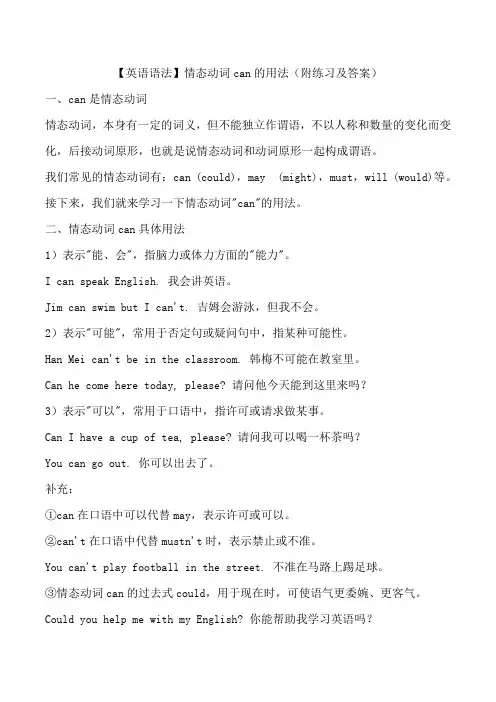
【英语语法】情态动词can的用法(附练习及答案)一、can是情态动词情态动词,本身有一定的词义,但不能独立作谓语,不以人称和数量的变化而变化,后接动词原形,也就是说情态动词和动词原形一起构成谓语。
我们常见的情态动词有:can (could),may (might),must,will (would)等。
接下来,我们就来学习一下情态动词"can"的用法。
二、情态动词can具体用法1)表示"能、会",指脑力或体力方面的"能力"。
I can speak English. 我会讲英语。
Jim can swim but I can't. 吉姆会游泳,但我不会。
2)表示"可能",常用于否定句或疑问句中,指某种可能性。
Han Mei can't be in the classroom. 韩梅不可能在教室里。
Can he come here today, please? 请问他今天能到这里来吗?3)表示"可以",常用于口语中,指许可或请求做某事。
Can I have a cup of tea, please? 请问我可以喝一杯茶吗?You can go out. 你可以出去了。
补充:①can在口语中可以代替may,表示许可或可以。
②can't在口语中代替mustn't时,表示禁止或不准。
You can't play football in the street. 不准在马路上踢足球。
③情态动词can的过去式could,用于现在时,可使语气更委婉、更客气。
Could you help me with my English? 你能帮助我学习英语吗?三、情态动词can的基本句型1)肯定句型为:主语+can+动词原形+其它。
They can play basketball. 他们能打篮球。
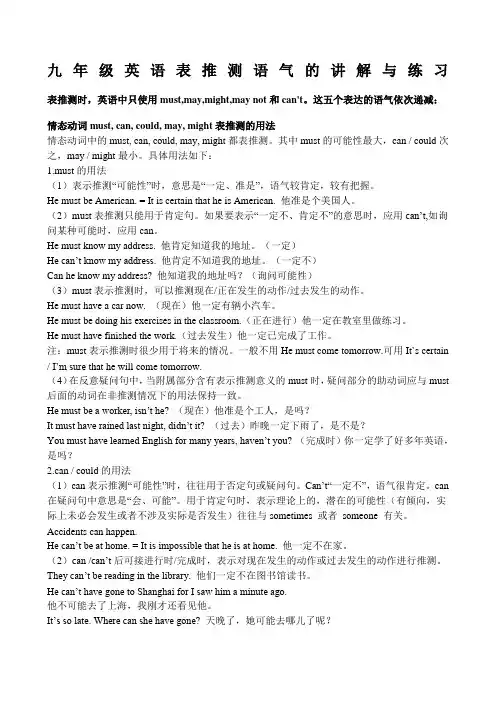
九年级英语表推测语气的讲解与练习表推测时,英语中只使用must,may,might,may not和can't。
这五个表达的语气依次递减:情态动词must, can, could, may, might表推测的用法情态动词中的must, can, could, may, might都表推测。
其中must的可能性最大,can / could次之,may / might最小。
具体用法如下:1.must的用法(1)表示推测“可能性”时,意思是“一定、准是”,语气较肯定,较有把握。
He must be American. = It is certain that he is American. 他准是个美国人。
(2)must表推测只能用于肯定句。
如果要表示“一定不、肯定不”的意思时,应用can’t,如询问某种可能时,应用can。
He must know my address. 他肯定知道我的地址。
(一定)He can’t know my address. 他肯定不知道我的地址。
(一定不)Can he know my address? 他知道我的地址吗?(询问可能性)(3)must表示推测时,可以推测现在/正在发生的动作/过去发生的动作。
He must have a car now. (现在)他一定有辆小汽车。
He must be doing his exercises in the classroom.(正在进行)他一定在教室里做练习。
He must have finished the work.(过去发生)他一定已完成了工作。
注:must表示推测时很少用于将来的情况。
一般不用He must come tomorrow.可用It`s certain / I’m sure that he will come tomorrow.(4)在反意疑问句中,当附属部分含有表示推测意义的must时,疑问部分的助动词应与must 后面的动词在非推测情况下的用法保持一致。
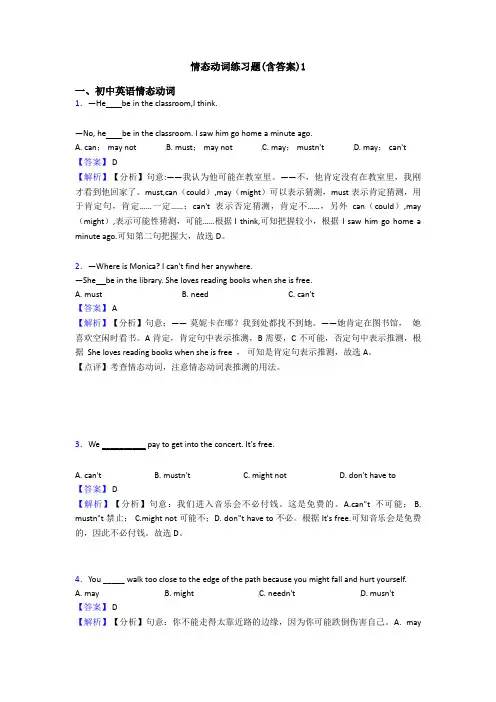
情态动词练习题(含答案)1一、初中英语情态动词1.—He be in the classroom,I think.—No, he be in the classroom. I saw him go home a minute ago.A. can; may notB. must; may notC. may; mustn'tD. may; can't【答案】 D【解析】【分析】句意:——我认为他可能在教室里。
——不,他肯定没有在教室里,我刚才看到他回家了。
must,can(could),may(might)可以表示猜测,must表示肯定猜测,用于肯定句,肯定……一定……;can't表示否定猜测,肯定不……,另外can(could),may (might),表示可能性猜测,可能……根据I think,可知把握较小,根据I saw him go home a minute ago.可知第二句把握大,故选D。
2.—Where is Monica? I can't find her anywhere.—She be in the library. She loves reading books when she is free.A. mustB. needC. can't【答案】 A【解析】【分析】句意:——莫妮卡在哪?我到处都找不到她。
——她肯定在图书馆,她喜欢空闲时看书。
A肯定,肯定句中表示推测,B需要,C不可能,否定句中表示推测,根据 She loves reading books when she is free ,可知是肯定句表示推测,故选A。
【点评】考查情态动词,注意情态动词表推测的用法。
3.We __________ pay to get into the concert. It's free.A. can'tB. mustn'tC. might notD. don't have to【答案】 D【解析】【分析】句意:我们进入音乐会不必付钱。
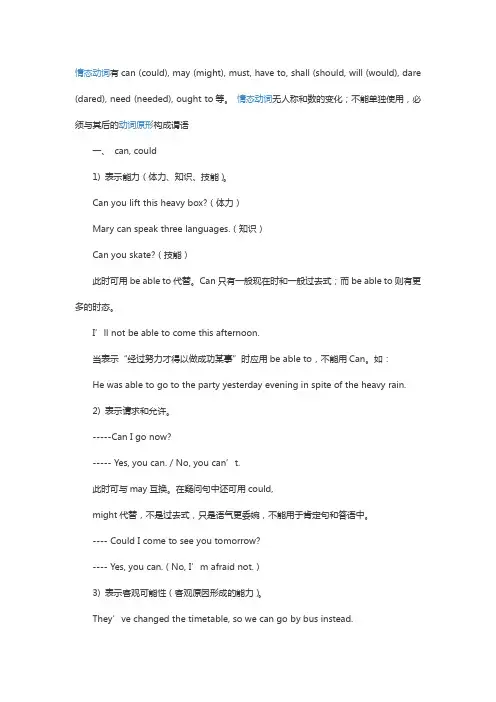
情态动词有can (could), may (might), must, have to, shall (should, will (would), dare (dared), need (needed), ought to等。
情态动词无人称和数的变化;不能单独使用,必须与其后的动词原形构成谓语一、can, could1) 表示能力(体力、知识、技能)。
Can you lift this heavy box?(体力)Mary can speak three languages.(知识)Can you skate?(技能)此时可用be able to代替。
Can只有一般现在时和一般过去式;而be able to则有更多的时态。
I’ll not be able to come this afternoon.当表示“经过努力才得以做成功某事”时应用be able to,不能用Can。
如:He was able to go to the party yesterday evening in spite of the heavy rain.2) 表示请求和允许。
-----Can I go now?----- Yes, you can. / No, you can’t.此时可与may互换。
在疑问句中还可用could,might代替,不是过去式,只是语气更委婉,不能用于肯定句和答语中。
---- Could I come to see you tomorrow?---- Yes, you can. ( No, I’m afraid not. )3) 表示客观可能性(客观原因形成的能力)。
They’ve changed the timetable, so we can go by bus instead.This hall can hold 500 people at least.4) 表示推测(惊讶、怀疑、不相信的态度),用于疑问句、否定句和感叹句中。
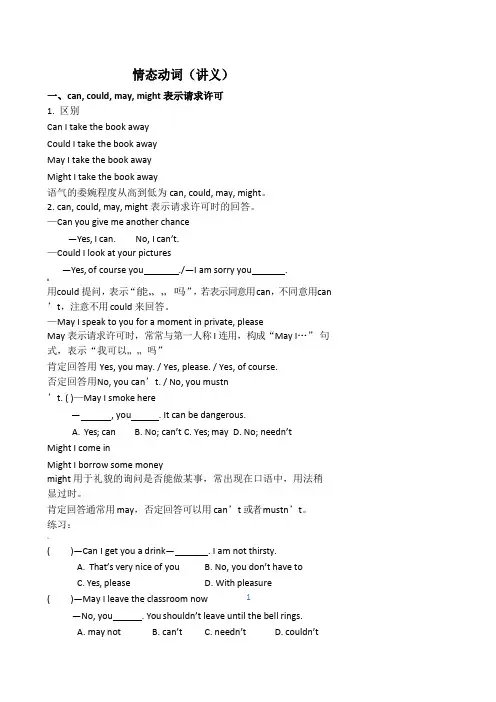
情态动词(讲义)一、can, could, may, might 表示请求许可1.区别Can I take the book awayCould I take the book awayMay I take the book awayMight I take the book away语气的委婉程度从高到低为 can, could, may, might。
2.can, could, may, might 表示请求许可时的回答。
—Can you give me another chance—Yes, I can. No, I can’t.—Could I look at your pictures—Yes, of course you ./—I am sorry you .#用c ould 提问,表示“能……吗”,若表示同意用 can,不同意用c an ’t,注意不用 could 来回答。
—May I speak to you for a moment in private, pleaseMay 表示请求许可时,常常与第一人称 I 连用,构成“May I…”句式,表示“我可以……吗”肯定回答用 Yes, you may. / Yes, please. / Yes, of course.否定回答用N o, you can’t. / No, you mustn’t. ( )—May I smoke here—, you . It can be dangerous.A.Yes; canB. No; can’tC. Yes; mayD. No; needn’tMight I come inMight I borrow some moneymight 用于礼貌的询问是否能做某事,常出现在口语中,用法稍显过时。
肯定回答通常用 may,否定回答可以用 can’t 或者 mustn’t。
练习:~( )—Can I get you a drink—. I am not thirsty.A.That’s very nice of youB. No, you don’t have toC. Yes, pleaseD. With pleasure ( )—May I leave the classroom now 1—No, you . You shouldn’t le ave until the bell rings.A. may notB. can’tC. needn’tD. couldn’t( )—you pass me a pen I’d like to write down the telephone number.A. NeedB. CouldC. MustD. Should ( )—Could I use your eraser for a while—Yes, of course you .A. couldB. willC. canD. should二、情态动词和短语情态动词1.情态动词needThe little girl needs to get some sleep.I needed two more days to finish thework. Do you need to have some coffeeneed 作实义动词,有人称,时态的变化。
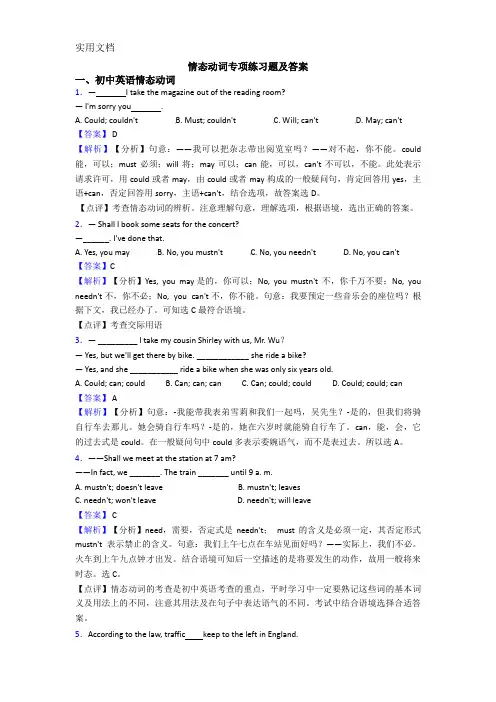
情态动词专项练习题及答案一、初中英语情态动词1.— I take the magazine out of the reading room?— I'm sorry you .A. Could; couldn'tB. Must; couldn'tC. Will; can'tD. May; can't【答案】 D【解析】【分析】句意:——我可以把杂志带出阅览室吗?——对不起,你不能。
could 能,可以;must必须;will将;may可以;can能,可以,can't不可以,不能。
此处表示请求许可,用could或者may,由could或者may构成的一般疑问句,肯定回答用yes,主语+can,否定回答用sorry,主语+can't,结合选项,故答案选D。
【点评】考查情态动词的辨析。
注意理解句意,理解选项,根据语境,选出正确的答案。
2.— Shall I book some seats for the concert?—______. I've done that.A. Yes, you mayB. No, you mustn'tC. No, you needn'tD. No, you can't【答案】C【解析】【分析】Yes, you may是的,你可以;No, you mustn't 不,你千万不要;No, you needn't不,你不必;No, you can't不,你不能。
句意:我要预定一些音乐会的座位吗?根据下文,我已经办了。
可知选C最符合语境。
【点评】考查交际用语3.— _________ I take my cousin Shirley with us, Mr. Wu?— Yes, but we'll get there by bike. ____________ she ride a bike?— Yes, and she ___________ ride a bike when she was only six years old.A. Could; can; couldB. Can; can; canC. Can; could; couldD. Could; could; can【答案】 A【解析】【分析】句意:-我能带我表弟雪莉和我们一起吗,吴先生?-是的,但我们将骑自行车去那儿。
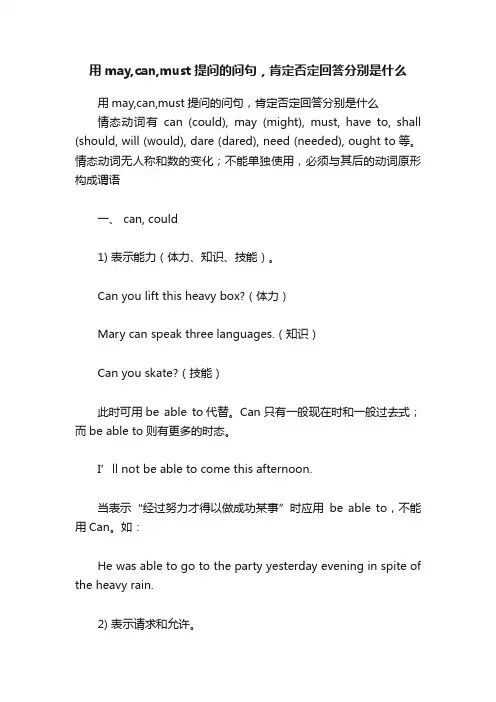
用may,can,must提问的问句,肯定否定回答分别是什么用may,can,must提问的问句,肯定否定回答分别是什么情态动词有can (could), may (might), must, have to, shall (should, will (would), dare (dared), need (needed), ought to等。
情态动词无人称和数的变化;不能单独使用,必须与其后的动词原形构成谓语一、 can, could1) 表示能力(体力、知识、技能)。
Can you lift this heavy box?(体力)Mary can speak three languages.(知识)Can you skate?(技能)此时可用be able to代替。
Can只有一般现在时和一般过去式;而be able to则有更多的时态。
I’ll not be able to come this afternoon.当表示“经过努力才得以做成功某事”时应用be able to,不能用Can。
如:He was able to go to the party yesterday evening in spite of the heavy rain.2) 表示请求和允许。
-----Can I go now?----- Yes, you can. / No, you can’t.此时可与may互换。
在疑问句中还可用could,might代替,不是过去式,只是语气更委婉,不能用于肯定句和答语中。
---- Could I come to see you tomorrow?---- Yes, you can. ( No, I’m afraid not. )3) 表示客观可能性(客观原因形成的能力)。
They’ve changed the timetable, so we can go by bus instead.This hall can hold 500 people at least.4) 表示推测(惊讶、怀疑、不相信的态度),用于疑问句、否定句和感叹句中。
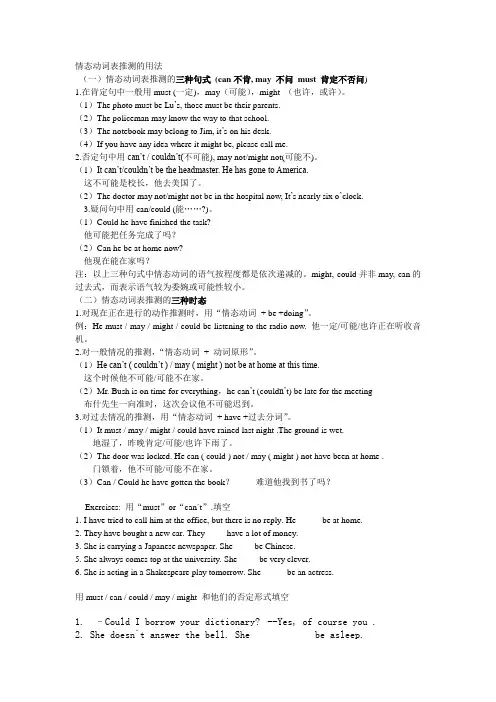
情态动词表推测的用法(一)情态动词表推测的三种句式(can不肯, may 不问must 肯定不否问)1.在肯定句中一般用must (一定),may(可能),might (也许,或许)。
(1)The photo must be Lu’s, those must be their parents.(2)The policeman may know the way to that school.(3)The notebook may belong to Jim, it’s on his desk.(4)If you have any idea where it might be, please call me.2.否定句中用can’t / couldn’t(不可能), may not/might not(可能不)。
(1)It can’t/couldn’t be the headmaster. He has gone to America.这不可能是校长,他去美国了。
(2)The doctor may not/might not be in the hospital now, It’s nearly six o’clock.3.疑问句中用can/could (能……?)。
(1)Could he have finished the task?他可能把任务完成了吗?(2)Can he be at home now?他现在能在家吗?注:以上三种句式中情态动词的语气按程度都是依次递减的。
might, could并非may, can的过去式,而表示语气较为委婉或可能性较小。
(二)情态动词表推测的三种时态1.对现在正在进行的动作推测时,用“情态动词+ be +doing”。
例:He must / may / might / could be listening to the radio now. 他一定/可能/也许正在听收音机。
根据汉语用适当的情态动词填空:1、Two eyes ___________ see more than one. 两只眼比一只眼看得清。
2、___________ the girl read before she went to school? 这女孩上学前能识字吗?3、The temperature ________ fall to –60℃, that is 60℃ below freezing. 气温可降至—60℃,也就是零下60℃。
4、He ____________ have enough money for a new car. 他不可能有足够的钱买新车。
5、___________ I have a look at your new pen? 我可以看一看你的新钢笔吗?6、He asked whether he _______ take the book out of the reading—room. 他问他可不可以把书带出阅览室。
7、Where ____________ they have gone to? 他们会去哪儿了呢?8、He _______________ be over sixty. 他不可能超过六十岁。
9、How ____________ you be so careless? 你怎么这么粗心?10、______________ you lend me a hand? 帮我一把好吗?11、I am afraid we _____________ give you an answer today. 恐怕我们今天不能给你答复。
12、You ____________ take whatever you like. 你喜欢什么就拿什么。
13、He told me that I _____________ smoke in the room. 他告诉我可以在房间里抽烟。
14、____________ I ask for a photo of your baby? 我可以要一张你宝宝的照片吗?15、He ___________ be at home. 他可能在家。
七年级英语情态动词can和could辨析练习题30题1.She____play the piano very well when she was young.A.canB.couldC.mayD.might答案:B。
could 表示过去的能力,句子中“when she was young”表明是过去的时间,所以用could。
can 表示现在的能力,may 和might 表示可能性,不符合题意。
2.____you swim now?A.CanB.CouldC.MayD.Might答案:A。
now 表明是现在的时间,用can 表示现在的能力。
could 表示过去的能力,may 和might 表示可能性,不符合题意。
3.My brother____ride a bike when he was five.A.canB.couldC.mayD.might答案:B。
“when he was five”表明是过去的时间,用could 表示过去的能力。
can 表示现在的能力,may 和might 表示可能性,不符合题意。
4.____I help you with your homework?A.CanB.CouldC.MayD.Might答案:A。
表示现在询问是否有能力帮助对方做作业,用can。
could 表示过去的能力,may 和might 表示可能性,不符合题意。
5.She said she____speak three languages.A.canB.couldC.mayD.might答案:B。
“said”表明是过去的事情,用could 表示过去有说三种语言的能力。
can 表示现在的能力,may 和might 表示可能性,不符合题意。
6.____you play basketball after school?A.CanB.CouldC.MayD.Might答案:A。
询问现在放学后是否有能力打篮球,用can。
情态动词must。
can。
could。
may。
might表推测的用法情态动词can / could表示推测时,意思是“可能、有可能”,语气比must弱。
XXX用于现在和将来,could用于过去。
1)表示可能性时,can / could后面接动词原形。
He canbe American。
= It is possible that he is American.他可能是个美国人。
2)表示不可能性时,用XXX。
He can`t be American。
=It is impossible that he is American.他不可能是个美国人。
3)can / could还可以表示“会、能够”的意思。
He can speak Chinese.他会说中文。
4)在疑问句中,XXX表示请求、允许、建议等意义。
Can you help me?你能帮我吗?Could you please pass me the salt?你能把盐递给我吗?3.may / might的用法1)may / might表示推测时,意思是“可能性很小”,语气比can / could更弱。
He may be American。
= It is possible thathe is American。
but the possibility is small.他可能是个美国人,但可能性很小。
2)may / might还可以表示请求、许可、建议等意义。
May I use your phone?我可以用你的电话吗?Might I suggest a different approach?我可以建议一种不同的方法吗?3)在虚拟语气中,XXX表示“可能性很小,甚至不可能”,表示一种假设的情况。
If I had studied harder。
I might have passed the exam.如果我学得更努力,我可能会通过考试。
总之,情态动词must。
神情动词 must, can, could, may,might表推测的用法:神情动词中的 must, can, could, may, might都表推测。
其中must的可能性最大, can / could次之,may / might最小。
详尽用法以下:1. must的用法( 1)表示推测“可能性”时,意思是“必定、准是”,语气较必定,较有掌握。
He must be American. = It is certain that he is American.他准是个美国人。
( 2)must 表推测只能用于必定句。
若是要表示“必定不、必定不”的意思时,应用 can`t, 如咨询某种可能时,应用can 。
He must know my address.他必定知道我的地址。
(必定)He can`t know my address.他必定不知道我的地址。
(必定不)Can he know my address?他知道我的地址吗?(咨询可能性)( 3) must表示推测时,能够推测现在/ 正在发生的动作 / 过去发生的动作。
He must have a car now.(现在)他必定有辆小汽车。
He must be doing his exercises in the classroom.(正在进行)他必定在教室里做练习。
He must have finished the work.(过去发生)他必定已完成了工作。
注:must 表示推测时很少用于将来的情况。
一般不用 He must come tomorrow.可用 It`s certain / I`m sure that he will come tomorrow.(4)在反意疑问句中,当隶属部分含有表示推测意义的 must 时,疑问部分的助动词应与 must 后边的动词在非推测情况下的用法保持一致。
He must be a worker, isn`t he?(现在)他准时个工人,是吗?It must have rained last night, didn`t it?(过去)昨晚必定下雨了,是不是?You must have learned English for many years, haven`t you?(完成时)你必定学了好多年英语,是吗?2. can / could的用法(1)can 表示推测“可能性”时,经常用于否定句或疑问句。
情态动词must--can--could--may--might表推测的用法————————————————————————————————作者: ————————————————————————————————日期:ﻩ情态动词must,can, could,may, might表推测的用法:情态动词中的must, can, could, may, might都表推测。
其中must的可能性最大,can / could次之,may / might最小。
具体用法如下: 1. must的用法ﻫ(1)表示推测“可能性”时,意思是“一定、准是”,语气较肯定,较有把握。
He mustbe American. =It is certain that he is Ameri can.他准是个美国人。
(2)must表推测只能用于肯定句。
如果要表示“一定不、肯定不”的意思时,应用can`t,如询问某种可能时,应用can。
He must knowmy address. 他肯定知道我的地址。
(一定)ﻫHe ca n`tknow my address.他肯定不知道我的地址。
(一定不)Can he know my address? 他知道我的地址吗?(询问可能性)ﻫ(3)must 表示推测时,可以推测现在/正在发生的动作/过去发生的动作。
ﻫHe musthave a car now. (现在)他一定有辆小汽车。
He must be doing his exercisesinthe classroom.(正在进行)他一定在教室里做练习。
ﻫHe must have finished the work.(过去发生)他一定已完成了工作。
ﻫ注:must表示推测时很少用于将来的情况。
一般不用He must come tomorrow.可用It`scer tain / I`m sure that he will come tomorrow.ﻫ(4)在反意疑问句中,当附属部分含有表示推测意义的must时,疑问部分的助动词应与must后面的动词在非推测情况下的用法保持一致。
May, might, can, could 表可能性1)may/might 表示‘可能’,往往可以交替使用,并无时间上的差异,只是用might 在口气上比用may 更加不甚肯定,从而比较婉转。
may/might 既可表示现在的‘可能’:. It may/might be true.He may/might be still waiting at the door.可能’ 也可表将来的‘ :. He may/might leave tomorrow.He may/might not to leave next week.,须用can 而不用may可能’ 在疑问句中表示‘ . Where can he beHe may be in the office.2)用can /could 表示现在的‘可能’,在口气上could 比较婉转。
. That’s not mine. Whose can it beIt could be John's. 用can ,表示‘可能’,较多的用于否定句中,而could 则不受此限。
. If you don’t have a guide, you could lose your way.(=it’s possible for you to lose your way.)It can’t/couldn’t be true.The moon cannot always be at the full.can 与may 的区别在否定句中,用can 表示‘可能’与用may 表示‘可能’往往产生含义上的微妙差异:用can 表示‘可能’往往表示逻辑上的‘可能性’;而用may 表示‘可能’则指事实上的‘可能性。
. The road can be blocked.(=It’s possible for the road to be blocked.)The road may be blocked.(=It’s possible that the road is blocked.)Another example:Mr. Reed is in poor health. He can be ill at any time.Mr. Reed looks pale. He may be ill.3)表示过去的‘可能’,可用‘may/might+ 不定式完成体或不定式完成进行体’ ,在这里用may/might ,也只有口气上婉转程度的差异,而没有时间上的区别:. He may/might have been hurt.She may/might have missed the train.也用‘can/could+ 不定式完成体’ 表示过去的‘可能’. He can’t/couldn’t have been hurt.She can’t/couldn’t have missed the train.用‘might/could+ 不定式完成体’ 有时可以表示本来可能发生但没有发生的,或者本来可能完成却没有完成的动作。